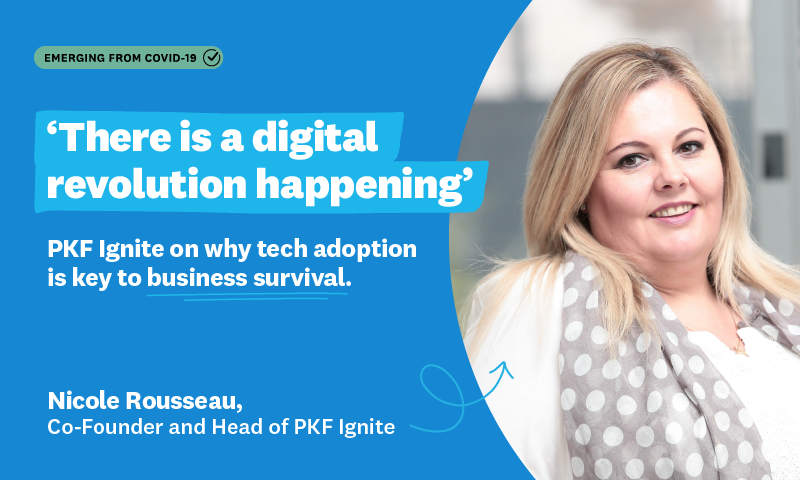
Many businesses have spent months focusing on the immediate term and making decisions necessary for their survival. As restrictions start to relax in South Africa and the community begins to consider medium and long-term priorities, this is the perfect time for businesses to reconsider the technology they’re using. It’s also a great opportunity for business owners to consider how technology can help them reach their goals.
For many businesses, working remotely and with reduced staff has been incredibly challenging, but technology has played a fundamental role in allowing work to continue.
Our recent State of Small Business research shows that tech adoption amongst small businesses and accounting practices has accelerated in recent years. Small business adoption of cloud accounting tech grew by nearly 50% between 2017 and 2020, and 87% of accounting firms currently use at least some cloud technology.
I spoke to Nicole Rousseau, Co-Founder and Head of accounting firm PKF Ignite, about why they went digital and how tech can help small businesses to survive.
What are some of the technology trends that will help small businesses through COVID-19 and beyond?
We have seen a big increase in clients wanting to move to cloud solutions during this pandemic. Businesses are realising that operating in the cloud is the only way to ensure they can continue to successfully operate and collaborate remotely in the longer-term too.
Beyond moving their books to Xero, we have seen a lot of clients moving their businesses and products online to make it easier for customers to buy from them. Although things are opening up again, there will be a longer-term shift in consumer buying habits that means ecommerce continues to be key.
Another trend is mobile accessibility, as well as the use of data capture tools, like Hubdoc, to manage invoices and receipts in a much more streamlined way. Businesses are also increasingly looking for integrated tech – so the ability to have all their different applications talking to each other and sharing information. This means moving away from standalone systems where time-consuming manual inputting is needed and instead integrating apps like Shopify or Vend to their Xero accounts.
What strategies for tech adoption have worked for your business?
There is a digital revolution happening and many small businesses will be looking to their accountants as advisors on how to digitise and streamline processes. That’s why in 2018 we made the decision to move into the cloud. As a large organisation, introducing that kind of transformation is challenging.
It was very important for us that our team understood why we were changing. To help do this we created champions and agents of change to champion the transition and support other staff. It was a massive change management undertaking, so we segmented all our clients and began a phased approach. We made sure our team was upskilled before any changes were implemented so they felt confident using the new tech with clients.
How can small businesses use technology to keep their business afloat?
One positive outcome from this crisis is that businesses have been compelled to adopt more advanced technologies than they may otherwise have considered. Investing in the right technology can increase productivity and eliminate a lot of human error and labour hours. By using technology to automate repetitive tasks, teams can focus on more important functions and spend time on generating more business.
Small businesses should consider the price of new technology not based solely on its price tag, but on whether or not it will pay for itself over time. Technology that automates tasks, for instance, will save time, reduce mistakes, streamline processes, and ultimately cut costs in the longer-term. And using technology that gives real-time access to financial information gives business the insights they need to make informed decisions. This is really important – especially at this challenging time – because it means business owners can make quick proactive decisions instead of reacting to issues.
If businesses are only adopting new technology now, what is the best starting point?
It is important to understand exactly what you are trying to achieve through adopting new technology. Once you have defined your goals and objectives, you should contact an expert in the field who can assist and help find the right solution for your business. You should map out the process properly and develop an implementation plan that’s realistic and achievable. I would also recommend keeping it simple and using a phased approach.
Leave a Reply